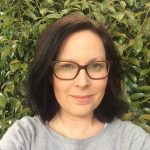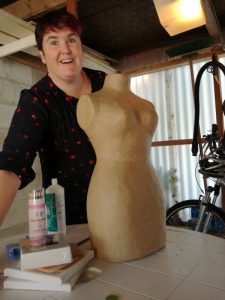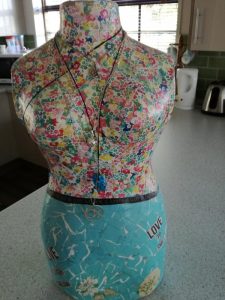
THE GOLD medal Kym O’Grady won in dressage on her supplied mount at the Special Olympic World Games in Shanghai nearly 11 years ago, holds pride of place in her Hamilton home alongside all the other ribbons and medals she’s won through a successful career.
While others would consider the glittering displays as evidence of success, Kym, 34, concedes she has still got a way to go before she considers herself successful.
It’s a surprising admission as she sits next to the framed gold medal, pictures and souvenirs from the 2007 Chinese Special Olympics Games.
There are other medals for equestrian and swimming too, and a mass of ribbons from regional and national competitions sitting in a heap on the kitchen table.
Winning the gold in Shanghai for dressage was an extraordinary achievement considering Kym didn’t even expect to go to China. Named a non-travelling reserve, Kym only found out she’d be joining the team two weeks before the games were due to start.
Kym first started riding horses at the age of four when her parents took her to Riding for the Disabled in Te Aroha. But it wasn’t until 2005, just two years before the games, that Kym started competing.
The O’Grady family moved to Hamilton when Kym was five. She attended Puketaha School, a small country school just north of the city.
Growing up on the autism spectrum wasn’t always easy.
“I got bullied for just not fitting in. And I didn’t do the normal things kids experience like getting invited to birthdays and playdates. I had no friends. I always thought when I was growing up my brother and Mum’s friends’ kids always got good jobs and good things.
“Now I’ve got good friends, but when I was younger it was really hard. And I was naughty – or I came across as naughty – and I got in trouble for being naughty. But I was just frustrated.”
Kym struggled as a child, sometimes lashing out in frustration when things didn’t come as easy for her as it did for others. A failure to recognise or accept Kym was different meant her actions were frequently mislabeled bad behaviour.
“The hardest thing for me is I look normal, but I think differently and take longer to process things – that’s a major for me. And I get extremely tired and frustrated sometimes. I can’t do things like others.”
Things changed for Kym at age 14 when she went to Salisbury School in Nelson, a boarding school for girls with complex learning needs.
“At Salisbury everyone was different but the same. Everyone had issues. And everyone didn’t judge people and were all on the same level.
“When I went to Salisbury School, that kind of changed my life. I wouldn’t be the person I am today.
“And having family support. We’re a strong-knit family. We’ve had our struggles and stuff because of me, but Mum and Dad have always believed in me and thought I could do it even when I didn’t believe in myself.”
Now as an adult, Kym values her independence and having control over her life. She shares a flat with a friend and works two days a week at Aspire Community Support. Kym credits her parents for supporting her to be independent and encouraging her to succeed even when she doubted herself.
“It’s really good to be independent. My parents always wanted me to be independent and I wouldn’t be the person I am today if they’d mollycoddled me. They didn’t treat me any differently. They knew I could do it even if I said I couldn’t.”
Kym’s now helping others to live more independently as a support worker at Aspire. She’s been with the organisation for over two years working in reception, but the support role is new. On Tuesdays and Fridays she helps make meals and organises art and craft activities at a residential home, she even takes two residents swimming.
“I was a bit anxious and nervous. It was going into the unknown – but not really. I’d actually volunteered there a few times, so what I’m doing now is sort of like what I did volunteering – but I’m getting paid.
“But I love it. It’s not really for the money. I love the girls and hanging out with them. They sort of lighten your day up. And it is more challenging than reception. There’s never a dull moment in the house. There’s always things happening.”
The new job is a ray of hope for Kym who has worked hard to manage her depression over the years.
“I’ve had heaps of knock-backs – more than goods things. At the moment everything’s settling into place now and things are happening for good.”
But it’s an ongoing journey. Kym says she still has good days and bad days. She manages her mental health with the help of a life coach to talk through her depression and help iron out some of life’s problems. She also tries to stay active, running and swimming, and she enjoys getting into the kitchen.
“I love cooking – cooking and baking – and that helps with depression as well. I like cooking new things and experimenting.”

The garage provides the ideal space for Kym to work on her art.
Art is another important outlet. Kym’s turned her small garage into a studio where she can draw, paint and decoupage.
But it’s having family and friends who believe in her when she doesn’t believe in herself that makes all the difference. Family like her parents, her happy wee niece Pepper, and Nan, who turns 90 in June.
“I go to Nan’s once a week to do her gardening. Once a fortnight I do her cleaning.”
The new job has helped too, giving her confidence and an opportunity to help support others who may be facing their own challenges.
“I’m better at the place where I am now working with the girls. I don’t get as tired because I’m not just sitting around. I’m moving all the time and everything’s different. Every day is different. There’s never a dull moment. I love it though, because I’ve got a disability myself and I just love helping others.
“I have a different perspective of it. Like, I don’t take anything for granted. I just know we’re all different.”
Other than the odd trek, Kym says she doesn’t ride horses much these days. But she’s still heavily involved in Special Olympics as a swimming coach and on the Asia Pacific Advisory Committee for sports rules in swimming.

Kym’s artwork is dotted around the sunny flat she shares with a friend.
She’s also a Special Olympics Global Messenger, raising awareness by speaking in the community about intellectual disability, the Special Olympics and her experiences.
It’s a role that will see her travel to the Dominican Republic in November for a Global Messenger conference, something Kym’s excited and nervous about in equal parts. But she’s not letting herself be fazed by this new adventure.
“I suppose everything I’ve done in life has been a challenge. I’m always willing to do anything that’s a challenge.”


